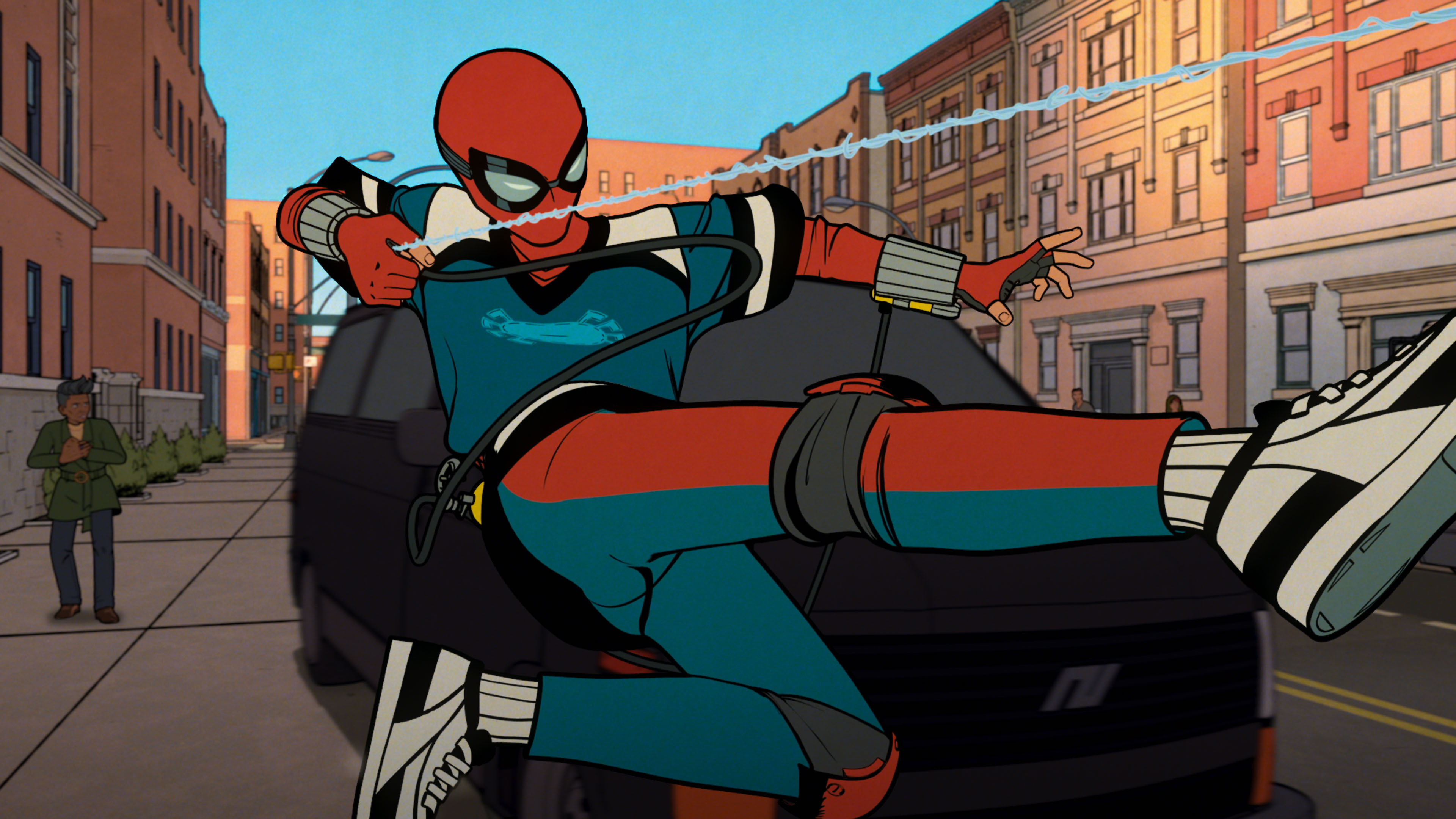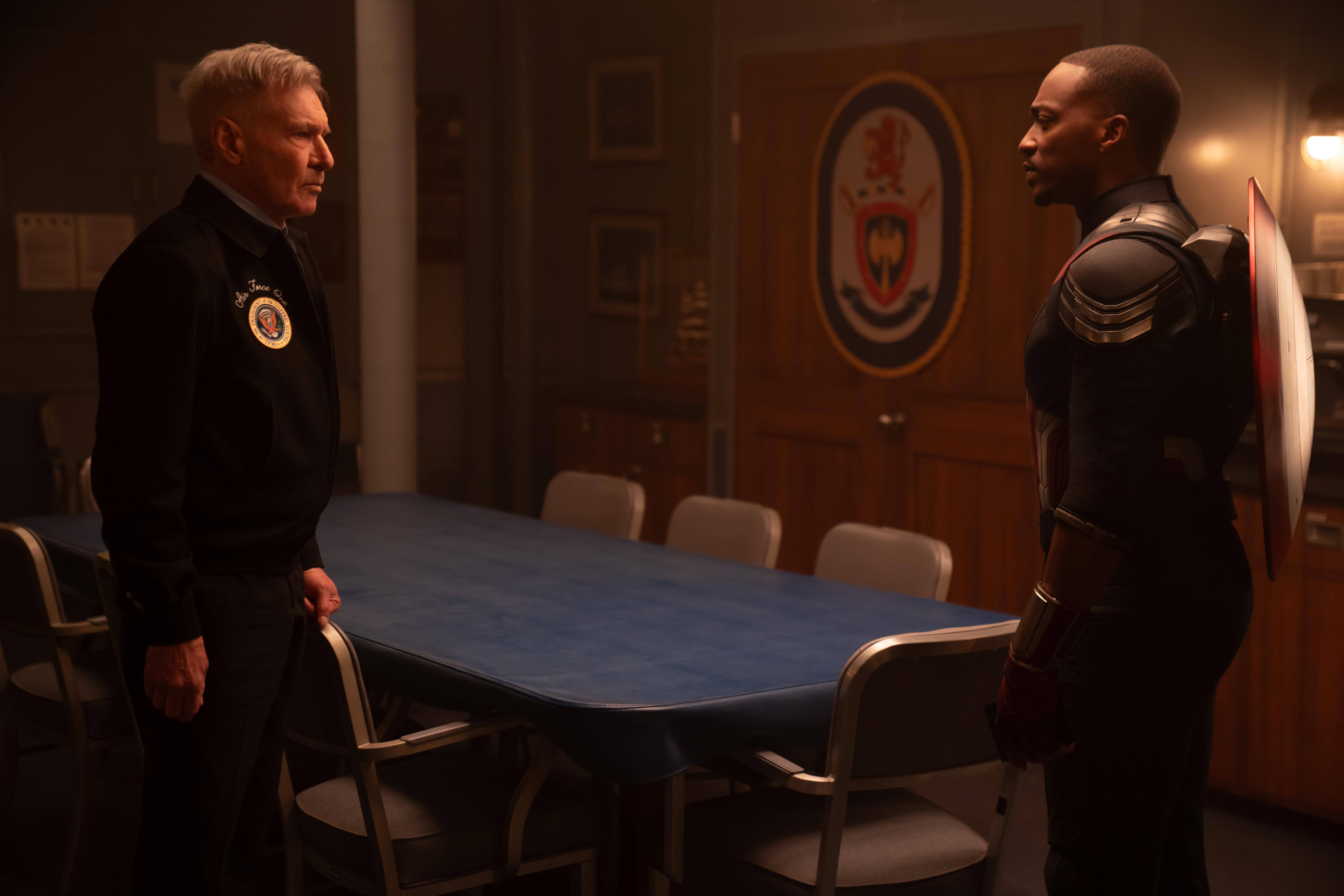By now most people know the secret behind Scott Pilgrim Takes Off: Scott Pilgrim — well, he takes off. He’s gone, for most of the narrative, leaving the players as we know them to pick up the pieces and figure out what happened to him. What happens to them in his absence is usually a total flip of what we’ve come to expect: Think Gideon introducing Lucas to the slowburn anime he’s been watching for a while (or maybe just a few days).
Bryan Lee O’Malley, who wrote the original comic and co-created the Netflix anime reboot with BenDavid Grabinski, knows that sort of remake is something audiences have come to expect. “I mean, it’s in the air, right? We’re all seeing remakes and reboots of everything,” O’Malley says.
When Scott Pilgrim Takes Off was in development he says he and the team looked at everything new in this vein they could, from The Matrix Resurrections to Spider-Man: No Way Home. But just as frequently he turned elsewhere for inspiration — Dragonball Z, Cowboy Bebop, Keep Your Hands off Eizouken!, or even Elden Ring. But none of these were quite the main catalyst, even something like Evangelion, which he calls “a good comparison, but not necessarily an influence.”
The real reason O’Malley wanted to make this story was simply: It was the only way he could see revisiting the world of Scott Pilgrim.
[Ed. note: This interview has been edited and condensed for clarity.]
Polygon: Starting off: I’m curious to hear a little bit about how you did justice by Matthew Patel, the lowest ranking evil ex.
:no_upscale()/cdn.vox-cdn.com/uploads/chorus_asset/file/25105700/Scott_Pilgrim_Takes_Off_u_S1_E5_00_20_38_18.jpg)
Bryan Lee O’Malley: Our first spark of idea was to kind of take Scott Pilgrim out of the picture after the first episode. And that naturally led to the process of: Then what happens to Matthew? What does Matthew get? And then what do the other exes think about it? So yeah, it really appealed to me right away, and to be like, Oh, then Matthew should win, and Matthew should become the boss. Because we’re going through all these different reversals of fortune; so someone goes from the top to the bottom, and someone has to go from the bottom to the top. And yeah, giving Matthew kind of his flowers was so much fun.
Were there any characters in particular — like Matthew, or just generally — that you felt most excited by like, OK, if we open up this world without Scott in it, what can you do?
I was excited to take on kind of all the exes; that was one of the biggest appeals to me of revisiting Scott Pilgrim, was just — I felt like I gave them short shrift in the books a little bit. I was making it up as I went along, and I was locked into Scott’s perspective. And I was younger and didn’t really know that much about other people like that! I certainly didn’t know about movie stars, or rock stars, I didn’t really know the details of how they lived; I just saw them in magazines, or whatever or in movies.
So now I’ve lived a little more, I’ve been in LA for a long time, and met lots of different types of people. And I think that just feeds back into kind of giving these characters a little more pathos, a little more depth and nuance — and pathos also in the sense of, like: pathetic; they’re also losers. And that was always really fun for me.
One of the things BenDavid told me was you were approached to adapt this, and you were wrestling with, Well, I’ve changed since I did this story, what does that mean? And I’m curious what sort of things you were really thinking about as you’re getting approached for this series that so many people love and so many people cherish and it hits different for you now.
Well, I mean that’s the initial fear. Netflix, and our producers, Jared [LeBoff] and Edgar Wright had approached me, we had talked about it a little bit — doing a series — and they were kind of keen on on doing it much more like the books initially. And for me that just made me kind of recoil. Like I don’t want to revisit myself at 25, necessarily. And it’s all there! It’s all on the page. So why would I want to relive that? Why would I want to perfect something that was so messy; it just seems like an impossible task.
Because the messiness is such a part of it. It’s part of the joy of it, is it’s messy, it’s complicated. It’s irreducible. So when faced with writing X number of TV episodes, I just thought, how the fuck am I gonna do that? I just had no idea, so it was really not until that dinner with BenDavid that that we just kind of started spitballing — not professionally; just kind of joking around [wondering], What can we do with these characters? And then a lot of those jokes we were like, Oh, actually, that would work. So you know, the joke of “Scott dies at the end,” or “Matthew becomes the boss” — those all just became something that we can really work with.
:no_upscale()/cdn.vox-cdn.com/uploads/chorus_asset/file/25105704/Scott_Pilgrim_Takes_Off_u_S1_E8_00_11_29_07.jpg)
At what point did it become clear to you that if we’re revisiting this, and we’re taking Scott out of it, and we’re giving everybody space to be a little bit more themselves, a little bit more nuanced — at what point did it kind of become: Oh, Scott might be the bad guy?
Well, I mean, that’s definitely part of the initial discussion. That’s a perception. I don’t really see Scott as the bad guy. But these days — this is a terrible thing to say in an interview — the perception definitely on Twitter and stuff kind of turned over the last maybe five years where now it’s like, “He’s a bad character!” “It’s a toxic relationship!” and all this kind of chatter.
And I think all that stuff is true. But I don’t think that people in the 2000s didn’t think it was true. Like, I think the younger generation is, like, We discovered that Scott is bad. But, you know, it says on the very first page he’s dating a high schooler; no one’s supposed to think that’s a good thing. I think in the 2000s, I took it for granted that people would be like, Oh, he’s terrible, but it’s funny. So now you kind of have to be a bit more explicit — it’s just the way our culture works, the way online works. Like, if you don’t outright condemn something, then the absence of condemnation is seen as a tacit approval.
So yeah, it was never a tacit approval. It was a tacit condemnation. But definitely in the show in the modern era, yeah, we have a scene where [we show] Scott, it’s not a good thing to date a high schooler. So — throw them a bone?
I’m curious how you interpolated but also synthesized a lot of those conversations that are happening around this property into this, since it feels like this show is so in conversation with those.
I’ve absorbed all those things over the years; I didn’t disappear after Scott Pilgrim finished. So in a lot of ways, I kind of want it to feel like Scott Pilgrim is back from the dead. You thought it was gone, but it’s back. But not only is it back, like it never left, it’s also been paying attention to you. It’s grown up alongside you.
:no_upscale()/cdn.vox-cdn.com/uploads/chorus_asset/file/25105706/Scott_Pilgrim_Takes_Off_u_S1_E7_00_24_05_13.jpg)
And we had to kind of cater to so many different audiences: someone like you, who read it a long time ago, and kind of has a memory of it, of what it felt like. But also someone who just read it last week for the first time, or someone who just discovered the movie, or somebody who hasn’t seen any of it. So it was just this really complex, but invigorating challenge of: how do we make this feel fresh, and also layered — and also hopefully staggering to some people who have thought about the book, but maybe not to this degree?
Did you find yourself being surprised by your reaction to revisiting this and reframing it in any way? Were there any characters who you felt ring a little differently or sit a little differently with you?
I don’t think I have a strong memory of how it hit back then. But it was really just a fun process, writing them and, and discovering these things and challenging ourselves to find new ways into everything.
I got to write the great scene where Knives and Kim sit down and play music together. And it’s not something I could’ve done in the comic, a) because it’s music. And then just the logistical challenge of making that happen, and making it feel organic and real, was very satisfying. And then that final scene, like just made plays magically for me. It was cool to discover those things by virtue of the collaboration with all these different artists and stuff. And that was that was the big new thing. It’s just letting other people in and letting their they all have their own different kinds of love for the series. And that shows, I think.
Scott Pilgrim Takes Off is now streaming on Netflix.











